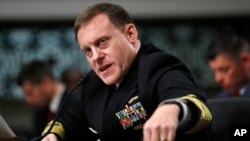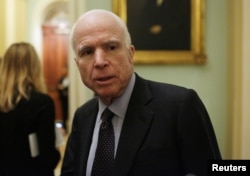The United States and its Western allies are still searching for a way to make countries like Russia pay a price for potentially destabilizing cyber attacks, even as those attacks keep coming.
The commander of U.S. Cyber Command, pointing to the recent French elections as evidence, warned lawmakers Tuesday that Russian efforts to undermine faith in democratic institutions have continued unabated.
"We had become aware of Russian activity," Navy Admiral Michael Rogers told members of the Senate Armed Services Committee, adding that U.S. officials went to their French counterparts and "gave them a heads-up."
"Look, we're watching the Russians," Rogers said the French were told. "We're seeing them penetrate some of your infrastructure. Here's what we've seen. What can we do to try to assist?"
What U.S. cyberofficials saw, according to Rogers, were attempts by Russian hackers to target now-French President-elect Emmanuel Macron.
Some of that information, along with falsified documents, was leaked late Friday, just 36 hours before French voters went to the polls in a runoff election between Macron, a centrist, and far-right candidate Marine Le Pen.
France's election commission has since confirmed hackers leaked a "significant amount of data" from the Macron campaign in an attack that closely resembled those carried out on the U.S. Democratic National Committee prior to the U.S. presidential election in November.
"We knew that this kind of risk would be present during the presidential campaign, because it has happened elsewhere," French President Francois Hollande told the French news agency AFP shortly after the leaks. "Nothing will be left without a response."
How to respond, however, remains a challenge, with the U.S. and its Western allies struggling to find ways to deter Moscow.
"We're seeing similar things with our German counterparts, with our British counterparts," Cyber Command's Rogers said of upcoming elections in those countries.
The goal should be to convince actors that "you don't want to do this," Rogers said, adding that adversaries like Russia also need to know "there's a price to pay for doing this."
Lawmakers remain concerned, though, that despite warnings by top intelligence and law enforcement officials, Russia will continue to target U.S. elections, and despite high-profile attacks like the Sony hack attributed to North Korea, the U.S. still lacks a policy to confront the threats.
"The new administration promised one within 90 days of the inauguration, but 90 days have come and gone, and no such strategy and policy have been provided," said the Senate Armed Services Committee chairman, Republican John McCain of Arizona. "Our nation remains woefully unprepared."
Lawmakers remain concerned, though, that despite warnings by top intelligence and law enforcement officials about Russia continuing to target U.S. elections, and that despite high profile attacks like the Sony hack attributed to North Korea, the U.S. still lacks a policy to confront the threats.
A report Friday by the Atlantic Council's Digital Forensic Research Lab concluded the hashtag used to spread work of the material hacked from the Macron campaign, #MacronLeaks, "was initially launched in the U.S. and driven by a cluster of alt-right accounts and probable bots."
"It was then picked up by Le Pen supporters, and probable bots, and passed on to the French audience," the report concludes.
"We need to be concerned," Rogers told lawmakers.
For now, Rogers urged Americans to be more discerning about information being pushed through social media and the Internet, adding, the U.S. must "publicly out" Russian attempts to sway public opinion.

